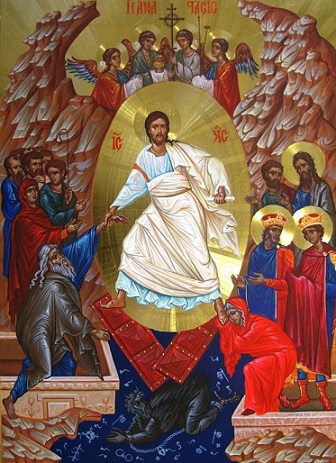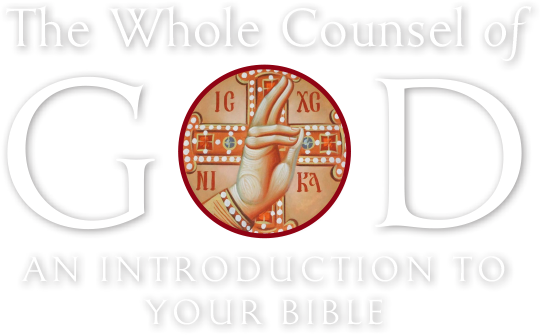 Many of the subtleties of St. Paul’s Greek, unfortunately, disappear in many English translations. This is not necessarily the fault of translators. For example, St. Paul refers to two different groups when he refers to “dead” without the article and “the dead” with the article. Despite this, it is difficult to translate texts into English without translating both as “the dead.” Liturgically singing that Christ is ‘risen from dead’ is awkward, at best, in English. In other cases, English translations reflect accurately St. Paul’s wording, but two ideas are so closely related in English that St. Paul’s distinction is unclear. So, for example, the apostle carefully distinguishes between “the Jews” and “Israel.” This distinction is often lost, however, to English readers who see these two words as designating the same group of people.
Many of the subtleties of St. Paul’s Greek, unfortunately, disappear in many English translations. This is not necessarily the fault of translators. For example, St. Paul refers to two different groups when he refers to “dead” without the article and “the dead” with the article. Despite this, it is difficult to translate texts into English without translating both as “the dead.” Liturgically singing that Christ is ‘risen from dead’ is awkward, at best, in English. In other cases, English translations reflect accurately St. Paul’s wording, but two ideas are so closely related in English that St. Paul’s distinction is unclear. So, for example, the apostle carefully distinguishes between “the Jews” and “Israel.” This distinction is often lost, however, to English readers who see these two words as designating the same group of people.
Such is also the case in St. Paul’s use of “the resurrection,” in Greek ‘anastasis‘, and the verb “to rise,” in Greek ‘egeiro’, as in “to rise from the dead.” This is not merely a case of a noun and a related verb. ‘Anastasis‘ has a related verb, ‘anistemi’, and ‘egeiro’ has an associated noun form, ‘egersis‘. ‘Egeiro‘ as a verb means ‘to rise’ as in, to rise from a bed. The associated noun means ‘awakening’. ‘Anastasis‘, on the other hand, refers to standing up or coming to attention. Through the interplay of these two terms, St. Paul, the other New Testament writers, and Orthodox hymnography are associating Christ’s rising from the dead as from sleep as a historical event with the event of the ‘anastasis’, the resurrection. This latter event, the resurrection or the rising up, is an event well known from prophetic literature in the Hebrew Bible. The apostles teach that Christ’s third-day resurrection is also the resurrection. It is the anastasis.
From the very earliest phase of the Hebrew Scriptures, the end of days, the last day, the day of Yahweh exists as an expectation. The day will come when Yahweh, the God of Israel, will visit his creation and his people. When he comes to visit, he will restore justice, the correct order of things. The action of restoring this state of justice is judging or rendering judgment. Within this expectation, there are a number of moments. It centers around the vindication of the righteous from the wicked and the punishment of those wicked. It came, over time, to include the resurrection of the dead as far too many of the righteous died without reward while all too many of the wicked died without any justice for the oppression and sin that took place at their hands. These emphases are commonly remembered in most discussions of the day of Yahweh in the Old Testament and the day of judgment in the New.
A major constituent element of this judgment, however, is all too often neglected or forgotten, despite being central to the Scriptures. This is the judgment of the rebellious spiritual powers who have themselves tempted, oppressed, and sought to destroy humanity. In addition to the devil receiving the power of death at the time of his being cast down to the underworld (Gen 3:14-15; Heb 2:14), other spiritual beings followed him into rebellion. The rebellious angels from the time of Noah are imprisoned in Tartarus, the abyss (2 Pet 2:4-5; Jude 6). Another group, however, remained unpunished until the day of Yahweh. This group of rebellious spiritual powers is those who were given positions of authority in creation at the time of the tower of Babel and subsequently came to seek the worship of humanity and through that false worship to enslave them.
At the tower of Babel, a ziggurat temple, the world’s people sought to bring God down and make him take up residence in the tower where they could ritually control and manipulate him. In response to this hubris, Yahweh withdrew from his creation, choosing to operate within the creation through created spiritual intermediaries. This included dividing the nations and assigning them to spiritual powers and principalities. This is described in several places. First, Deuteronomy 32:8-9 states, “When the Most High assigned the nations their inheritance, when he divided humanity, he set the borders of the peoples according to the number of the sons of God (Gr. his angels). But Yahweh’s portion is his people, Jacob is his allotted inheritance.” Though he withdrew from the nations as a whole, he created the nation of Israel for himself from Abraham and drew close to her. It is for this reason that Daniel refers to evil powers as the ‘prince of Persia’ and the ‘prince of the Greeks’ (Dan 10:13, 20). These spiritual beings are also connected to the sun, moon, and stars to which Yahweh assigned the nations (Deut 4:19-20).
Judgment is due to these powers and principalities. Isaiah describes it, “On that day, Yahweh will punish the heavenly host in heaven and the kings of the earth on the earth. They will be gathered together as prisoners in the abyss. They will be sealed in a prison and after many days they will be punished. Then the moon will be confounded and the sun ashamed for Yahweh Sabaoth reigns on Mount Zion and in Jerusalem and his glory will be before his elders” (Is 24:21-23). That the powers will be imprisoned for many days implies a period of time after the day of Yahweh during which this imprisonment takes place and at the end of which their defeat becomes final. This period during which the forces of evil are bound or restricted becomes a critical element of New Testament eschatology.
The most vivid and important depiction of this judgment, however, takes place in Psalm 82 (81 in the Greek numbering). In the Psalm, God takes his stand in the council of the gods and issues judgment against them (v. 1). While he had assigned them to establish and maintain justice and govern the nations, they have become corrupt and have oppressed the poor and the weak (v. 2-4). In response, he tells them that they are gods and sons of the Most High, but they will die like men and like one of the principalities they will fall (v. 6-7). The Psalm culminates in a call: “Arise (anasta), O God, and judge the earth, for you will inherit from all the nations” (v. 8). This call for God to arise (anasta) and render judgment against his spiritual enemies, the spiritual enemies of man, is repeated throughout the Hebrew Scriptures, particularly in the Psalter (eg. Ps 3:7; 7:6; 9:19; 10:12; 12:5; 17:13; 68:1; 74:22; 102:13; Is 33:10). In Greek, this event would be known as the anastasis, the arising.
With this understanding in mind, a number of passages in Scripture are clarified and a number of the connections drawn by St. Paul and other New Testament authors become clear. Before raising Lazarus from the dead, Christ has a conversation with his sister, Martha, in which there is a wordplay. Christ tells Martha that Lazarus will arise (anastesetai) (John 11:23). Martha replies that she knows that he will arise (anastesetai) in the anastasis (v. 24). Christ responds, “I am the anastasis” (v. 25). The related verb is clearly used to describe Lazarus returning from the dead. The noun, however, clearly refers to a particular event, the arising of God on the last day to render justice. Christ is, therefore, identifying himself as the visitation of Yahweh to his people in order to restore justice, which justice will include the subjugation of the demonic powers.
It is because of his identification of Christ’s rising from the tomb with the anastasis that St. Paul treats the death and resurrection of Christ as a victory not only over the one who holds the power of death, the devil but also over the powers and principalities of this present age (1 Cor 2:8; Col 2:15). The New Testament authors saw the period between Christ’s ascension and enthronement and his return as that period when the demonic powers were bound and restricted before their final judgment (Ps 110:1-2; 1 Cor 2:6; 1 Pet 3:22; Rev 20:1-3, 7-10). Christ’s defeat of these powers and principalities means that the nations are no longer subject to them, but to him (Matt 28:18-20; Rom 8:38-39; Gal 4:3, 9-10; Col 2:8, 20-21). Nevertheless, they remain our enemies in this present age (Eph 3:10; 6:12). This will culminate, for St. Paul, on that day when Christ “delivers the kingdom to God the Father after destroying every dominion and every principality and power, because he must reign until he has put all of his enemies under his feet” (1 Cor 15:24-25).
Those party to the old covenant cried out for the day on which Yahweh would arise and judge the earth in righteousness, bringing his enemies, the enemies of humanity, to destruction. This day, the anastasis has already taken place on the day in which Christ awoke as from sleep and arose saving us. The powers and principalities, the gods of the nations, have been bound and stripped of their power. Their judgment has already been delivered. On the last day of Christ’s glorious appearing, they will meet their fate of eternal death, torment in the lake of fire. “Christ is risen,” “Christos anesti,” states the whole gospel, Christ’s victory over the powers of evil, in two words.

So were the angels that were assigned different nations not part of the 1/3 of angels that joined Lucifer in rebelling against God? Because I’m not seeing why you’d want to assign any of those guys to be in charge of anything. But I thought there was only one angel rebellion, so I am confused.
Actually, there were three spiritual rebellions, beginning with the devil in Genesis 3. Here’s some more on that:
https://blogs.ancientfaith.com/wholecounsel/2018/10/03/genesis-and-the-fall/
https://blogs.ancientfaith.com/wholecounsel/2018/12/05/who-is-the-devil/
https://blogs.ancientfaith.com/wholecounsel/2018/12/10/the-angels-who-left-their-former-estate/
https://blogs.ancientfaith.com/wholecounsel/2018/12/14/who-are-demons/
https://blogs.ancientfaith.com/wholecounsel/2018/12/17/who-is-the-satan/
Great post. I think this is our theodicy as well as our Gospel. This is not a full answer to evil, but to why “evil” after Christ. We’re part of the takeback and it’s slow, mustard tree growing, yeast-rising, and includes suffering violence. I’ve been saying this view of really, our Gospel, proves Christus Victor – but to narrow it down to two words, that’s just sweet.
Father, this narrative needs developed, worked into our telling of the Gospel even into children’s Bibles. This is the correction to the Original Sin narrative with which we’ve, almost all of us, been ruined in our imaginations. People won’t take their salvation so seriously until they know the story they are part of.
God bless you!
Absolutely wonderful Fr. Stephen. I heard Dr. Hart speaking of the problem of evil (in philosophy), particularly the suffering of infants. He came to roughly the same conclusion as your exegesis – we have to posit that the whole creation, in some sense, is in bondage and subject to the whims of adverse powers, in this age.
Father Stephen,
In Revelation 20:3, the verse ends with “But after these things he must be released for a little while.”. Is this release of Satan (and his demons?) for the purpose of “their final judgment” that you refer to? I have always wondered about that ‘release’.
Thank you.
Short answer: Yes.